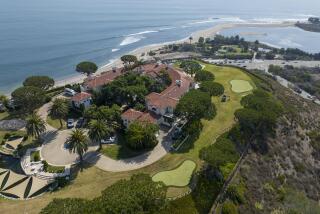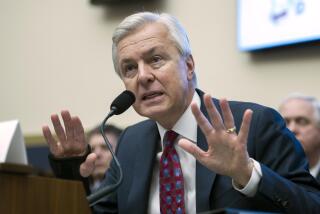Ties Between Bank and African Oil State Probed
- Share via
WASHINGTON — A federal grand jury and a Senate subcommittee are investigating the relationship between a prominent Washington bank and a tiny, oil-rich West African state.
Investigators are scrutinizing hundreds of millions of dollars in accounts held at Riggs Bank by the government of Equatorial Guinea and its ruler, Brig. Gen. Teodoro Obiang Nguema Mbasogo. Sources familiar with the probes said investigators were trying to determine whether any deposits into Obiang’s personal accounts were the fruits of corruption and whether funds from a state account were diverted to the president or his family members.
The Times first reported on Riggs’ relationship with Equatorial Guinea last year, which prompted the bank to conduct an internal investigation. Riggs subsequently dismissed Simon Kareri, a senior executive overseeing the Equatorial Guinea accounts.
In February, Riggs ordered Equatorial Guinea’s government to withdraw all of its assets from the bank. U.S. government and banking sources said Equatorial Guinea has had difficulty finding another U.S. bank to take its money, and most, if not all, of its deposits are still held at Riggs.
“Riggs’ security procedures detected questionable activities on the part of Simon Kareri,” said Mark Hendrix, a bank spokesman. “Riggs turned the matter over to U.S. criminal authorities. Riggs is cooperating with authorities and, in light of the investigations, views it as inappropriate to comment further on these matters.”
Investigators also are examining accounts held at Riggs by the Saudi Arabian government and Saudi officials.
The Treasury Department requires American financial institutions to closely monitor deposits from “senior foreign political leaders, their families and close associates.” They are required to report any suspicious transactions to banking regulators.
Riggs, which holds $6.4 billion in assets, signed a consent order in July with the Office of the Comptroller of the Currency, or OCC, that called for it to tighten its compliance with federal banking rules. The company recently said that regulators might fine it for not meeting the terms of the agreement.
Kareri could not be reached for comment. His attorney, Jonathan Shapiro, did not return phone calls. Shapiro, a high-profile attorney based in Virginia, previously represented convicted sniper John Allen Muhammad.
A source close to Kareri said his firing was unjust. “The bank was looking for a fall guy so it could go to the OCC and demonstrate that Riggs was cleaning up its act,” the source said.
The Equatorial Guinea Embassy did not return a phone call Friday seeking comment. Last month, an embassy official declined to answer questions about the Riggs accounts.
Obiang has ruled the nation since 1979, when he staged a coup. He has been reelected twice in balloting widely viewed as fraudulent, winning 99% of the vote in 1996 and 97% in 2002.
In recent years, Equatorial Guinea has emerged as sub-Saharan Africa’s third-largest oil producer, after Nigeria and Angola. The country’s economy is growing quickly, but most of its 500,000 people remain impoverished.
During an interview last year, an official at the Equatorial Guinea Embassy in Washington told The Times that Obiang’s presidential salary was about $5,000 a month. Yet Obiang, who was commander of the armed forces before seizing power, has accumulated enormous wealth while in office.
A business group he controls owns vast tracts of land, and he and his family own stakes in the nation’s cement, telecommunications, airlines, hotel and real estate industries. Most businesses in Equatorial Guinea “are owned by government officials and their family members,” the CIA’s World Factbook says.
“When I was there, there was literally nothing that moved onshore or offshore which Obiang or someone from his immediate family didn’t get a cut of,” said John Bennett, who served as the U.S. ambassador to Equatorial Guinea until 1994.
Equatorial Guinea’s largest account with Riggs held hundreds of millions of dollars in oil earnings deposited by American companies active in the country, primarily ExxonMobil Corp. and Amerada Hess Corp. Although formally a state account, it is in effect controlled by Obiang, said multiple sources interviewed by The Times. Collectively, U.S. oil companies have invested about $5 billion in the nation’s oil industry.
One source said that Riggs officials said that funds from the national account were sent to offshore companies in which the president or family members had ownership stakes.
ExxonMobil acknowledged making payments to Equatorial Guinea’s government account. “We want to emphasize that ExxonMobil has no knowledge of banking operations at the Riggs Bank,” said Bob Davis, an ExxonMobil spokesman. “All of our deposits have met our legal obligations to the government of Equatorial Guinea.” Amerada Hess did not return a phone call seeking comment.
Three sources familiar with the investigation said Obiang also had personal accounts at Riggs amounting to more than $10 million. Real estate records show that the bank helped Obiang purchase two homes in Maryland, including a $2.6-million mansion that was bought for cash in 1999.
Sources also confirmed that Riggs held accounts for Teodoro Biyogo Nsue, Equatorial Guinea’s ambassador to the U.S. and Obiang’s brother-in-law, and for Obiang’s son, Teodorin Nguema Obiang.
The latter is a government minister but spends little time in the country. Housing and business records show that the son owns a $6-million home in Los Angeles as well as a music company in L.A. called TNO.
Armengol Ondo Nguema, Obiang’s brother and the country’s feared security chieftain, also held a personal account at Riggs. In correspondence obtained by The Times, Kareri referred to Nguema -- who is accused in U.S. State Department reports of employing torture -- as a “valued customer.”
The federal grand jury, which was convened in mid-February, is closely examining Kareri’s activities. In 1994, Riggs hired him to handle embassy banking for Africa. Kareri also offered private-banking services for wealthy investors.
Kareri brought the Equatorial Guinea government account to Riggs, and it became one of the bank’s biggest depositors. In 2001, Kareri was promoted to senior vice president.
Kareri is close to Obiang and his family. Records show that he is also a board member of the U.S.-based Foundation of the Friends of Equatorial Guinea and the United States, whose aim is to promote stronger ties between the two countries. Other board members of the group include Equatorial Guinea’s representative to the International Monetary Fund and the country’s minister of justice.
Sources told The Times that Riggs’ demand that Equatorial Guinea withdraw its funds reportedly occurred after a tense meeting in Washington among bank officials, Obiang, the FBI and several government representatives. An FBI official said the agency could not comment on an ongoing investigation.
The Senate Permanent Subcommittee on Investigations is also examining Riggs’ relationship with Equatorial Guinea. A committee staffer would not comment on the matter, but Davis, the ExxonMobil spokesman, confirmed that Senate investigators had questioned his company.
“Our participation has been voluntary and cooperative,” he said. “We understand that a number of companies are being asked to provide information” to the subcommittee.
More to Read
Sign up for Essential California
The most important California stories and recommendations in your inbox every morning.
You may occasionally receive promotional content from the Los Angeles Times.












